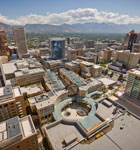At a Glance
Location
Wixom, MI
Founded
1950
Employees
18
Specialty
Concrete work, including trenched foundations and poured walls for residential and commercial construction
Over the years, even as innovation has dramatically changed the landscape of the construction field, a strong customer-focused approach has remained a solid way to build a business. With more than 60 years of history under its belt, Tru-Wall Construction Co., Inc. is an enduring testament to this model.
“What sets us apart is the superior service we give and our dedication to each project,” company president and co-owner Dave Car says. “If something goes wrong or needs to change, we adapt and make it right. Our reputation is based on our service and the fact that we stand behind the work we do.”
Based in Wixom, Michigan, Tru-Wall’s business is built around the niche of poured-concrete work, including trenched foundations, basement walls, and retaining walls. The bulk of the company’s work is new construction, which is split almost equally between residential and commercial projects.
Car began working for Tru-Wall in 1965, right out of high school. He started as a laborer and worked his way up to the title of engineer, then superintendent. In 1975, the original owners, who founded the company in 1950, sold Tru-Wall to Car and another employee, Wayne Malila. “I grew up watching my dad work in the same field, watching him mix concrete by hand, so the work was familiar to me,” Car says. “I still get a heck of a kick out of visiting job sites and still enjoy the smell of the concrete.”
Top 5 Steps for Pouring Concrete
1. Form the footings. “Day one on the job site involves setting the basic footings,” Dave Car says. “We construct the rails, set the re-steel, and then pour the concrete into the base to make the footings.”
2. Set the forms. “Day two, we bring in the forms, which vary in size from 6 to 12 feet. We set the forms with our 20-ton mobile cranes, add more re-steel, and then pour concrete into the forms.”
3. Remove the forms. “Day three, we remove the forms and start working on the finishing work.”
4. Do the detail work. “Days three and four, we complete any finishing work, including laying outside drains and damp proofing the concrete.”
5. Finalize the foundation. “The last thing we do is add trench footings [if there is a garage] and backfill the work area.”
When Malila retired in 2000, Car stayed with Tru-Wall and took a new partner, Dino Grassi, in 2005. “We know our niche in the business and have become very good at what we do,” Car says. “We’ve built a solid reputation with area builders and contractors, so most of our work now comes from referrals.”
The company has worked with some area builders for more than 40 years, one of them being Singh, a Michigan-based builder of senior-living facilities, apartments, single-family homes, and mixed-use commercial spaces. “We poured the very first basement of the first home they built in 1974, and we’ve poured every basement for them since that day,” Car says.
Tru-Wall has even completed work for Singh out of state. The building company began working on a senior-living complex in Cary, North Carolina, and, unable to find a local company to provide the turnaround it required, Singh asked Tru-Wall to step in. “[Singh] was told it would take six months to do the foundation work, but we were able to complete it in half the time,” Car says. “As a result, we’re going to be working with them on another senior-living project in Charlotte, North Carolina, in 2012.”
The company is known for taking on challenging projects that others might turn down, including a recent job in Saline, Michigan, that required 23-foot-high walls for a two-story barn. “That job really stretched our capabilities,” Car says. “It was quite an accomplishment for us since the average height of most of our projects is 10 feet.”
Another recent accomplishment was a 30,000-square-foot home in Superior Township, Michigan. The residence required 12-foot foundation walls with heavy reinforcement to support a multicar garage and an indoor swimming pool.
While the scope of Tru-Wall’s work may change, Car notes that many aspects stay the same, including the satisfaction that comes with a job well done. “Everything evolves,” he says. “We’re constantly investigating new mixtures that make concrete more durable or implementing new safety regulations. But the one thing that never changes is the physicality of the work. It’s hard work, and you still have to get in the mud and work through all kinds of weather to get the job done. This work requires a special person with a particular drive and passion. The reward, however, is the simple pride in doing a good job. You start with a hole in the ground, and when you leave, you can truly see the work that you’ve accomplished.” ABQ


